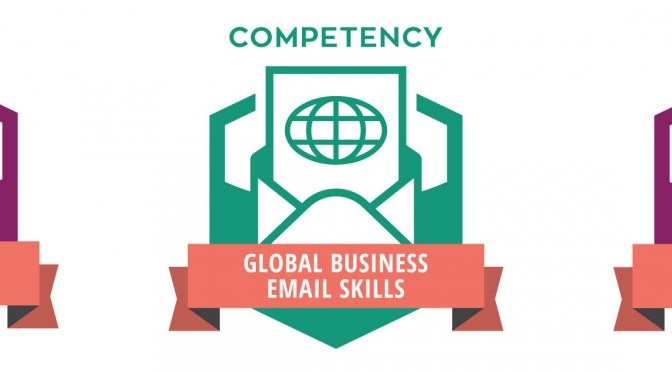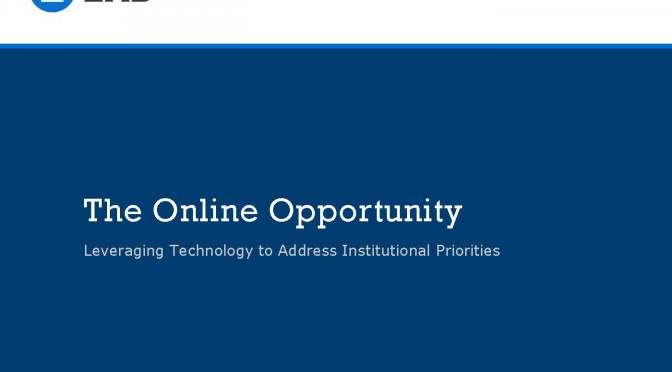UC Irvine has launched a new low-residency hybrid (or “mixed format”) master’s in Human-Computer Interaction and Design. The one-year program boast an “interdisciplinary orientation” and aims to prepare students for careers in UX, systems analysis, and project management.
Category Archives: New Online Programs
Link: 6 Universities Partner on Credentialing Initiative
Continuing education units at Wisconsin, Washington, Georgia Tech, UCLA, UC Davis, and UC Irvine are collaborating on low-cost micro credentials offered via a common storefront, the University Learning Store. Individual courses address topics common to the needs of many working professionals, cost between $50 and $150 apiece, include a digital badge as proof of competency, and can be stacked into certificates. Current certificates include:
- Workplace Writing
- Effective Business Writing Skills
- Business Communications
- Global Business Communication
Link: UMassOnline Launches Badge Program
UMassOnline, the University of Massachusetts’ online consortium, has announced the first non-credit badge program, in Project Risk Management, offered through the College of Advancing and Professional Studies (CAPS) at UMass Boston. …
The Project Risk Management badge is a self-paced online sequence of modules that covers the six steps of project risk management as prescribed by the Project Management Body of Knowledge (PMBOK).
“UMassOnline Launches Badge Program,” eCampus News, March 31, 2016.
File: EAB Presentation to UO: The Online Opportunity
An updated version of this Education Advisory Board presentation, given to the online/hybrid task force on March 7, 2016.
[embeddoc url=”https://blogs.uoregon.edu/edtechknowledge/files/2016/03/EAB-The-Online-Opportunity-University-of-Oregon-03-07-16-1iy2oec.pdf” download=”all” viewer=”google”]
Link: MIT Expansion of Innovative Programs, Including Continuing Ed Online
Details are scant, but MIT is venturing more firmly into the world of online continuing education for professionals (including but not limited to their own alumni). They are beginning with a four-course (certificate?) systems engineering program in partnership with Boeing and NASA.
Given the pace of innovation, really, if you got a computer science degree 10 years ago, are you still prepared for the real world?
Link: MIT Dean Takes Leave To Start New University Without Lectures Or Classrooms
What if you could start a university from scratch for today’s needs and with today’s technology? MIT Dean Christine Ortiz is hoping to answer this question through a new venture–but unlike other efforts, hers will be not-for-profit.
Ms. Ortiz says she plans to create a nonprofit institution so that “all of the revenue can be reinvested in the enterprise to serve the public.”
LINK: OSU opens research unit for online teaching, learning
“The OSU Extended Campus Research Unit is designed to create an accessible and inclusive online learning environment.”
“Oregon State is in a position to build a robust research pipeline that ultimately will improve the access and quality of online teaching and learning for our adult learners,” [Lisa L.] Templeton said. “It will allow the university to expand its reach even further and give students more opportunities to succeed.”
Link: 3 Truths and 5 Recommendations for Online Programs
If teaching online is harder, takes more time, and even more disastrous if done poorly than face-to-face learning is, why should anyone launch an online program? Inside Higher Ed blogger Joshua Kim showcases how in spite of these challenges, developing new online programs can help grow institutional capacity and foster innovation. The comments on this post are also valuable!
Moving a program online is an opportunity to rethink the program.
Udacity and Google Unveil Co-Developed Nanodegree
For-profit online education provider Udacity and Google today unveiled a new micro-credential program, the Senior Web Developer Nanodegree. The online program is designed to provide students with “the tools, frameworks, and techniques needed to write robust code for progressive Web applications that are secure and easy to use,” said Sarah Clark, program manager in Google’s Developer Training group, in a blog post.
Read full article here.
Links: New and Expanding Online Graduate Degrees at Syracuse University
A representative example of a major trend in online education. Syracuse University is growing professional master’s programs and expanding online coursework available in high-profile areas of interest, such as data science.
- The Daily Orange, Oct. 21, 2015: “SU Officials Discuss Rise in Online Classes, Programs.”
- Syracuse University News, Feb. 17, 2015: “Online Education Gains Momentum at Syracuse With Innovative Programs.”
Also of note is a presentation given at the UPCEA 100th Annual Conference in March 2015, during which employees of Syracuse University discussed a survey of technology staff that highlighted the pros and cons of their decentralized working environment. The survey was based on the OLC Quality Scorecard.


